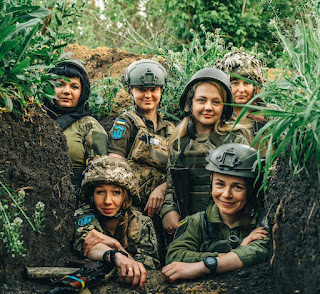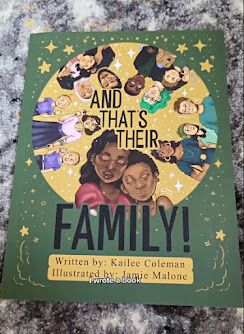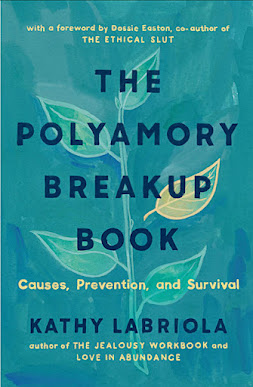Opening certain marriages *can* save them. New polyamory books, new entry in Best Poly 101s, and more.
A former client shared, "Forever is a long time, and our needs have changed over the years. I love her and want to stay married, but I am unfulfilled sexually–and have been for a long time....”
When Multiamory authors Dedeker Winston, Emily Sotelo Matlack, and Jase Lindgren started producing their advice show about polyamory and other non-traditional relationships, they received dozens of questions from listeners about all sorts of relationship quandaries and communication stalemates. They quickly found out that existing relationship tools weren’t up to the task, and that conventional wisdom is sorely lacking for modern relationships. ...
Over many years and hundreds of episodes, they have spent hours nerding out over research, reading up on evidence-based relationship advice, and listening to the personal struggles of hundreds of couples and individuals. They have re-tooled commonplace communication frameworks to fit modern-day relationships, and when there was no existing tool that fit, they put on their inventor hats and developed their own. This has led to the creation of Multiamory: Essential Tools for Modern Relationships, a curated collection of the most popular communication tools, advice, and wisdom from the Multiamory podcast:– Get what you need out of conversations with your partner with the Triforce of Communication
– Create Microscripts that will interrupt old patterns, diffuse tension, and form better communication habits
– Process and reconnect after an argument with Repair SHOP
– Determine your unique processing style, and how it may be clashing with your partner’s
– Set up a regular RADAR check-in to support the long-term health of all of your relationships....
I've just ordered a copy. Read the first few pages.
● New kids' book. Kailee Coleman includes poly representation in her educationally inclusive And That's Their Family. She writes us, "Polyamory is incredibly underrepresented in children's literature and I wanted to change that."
Here she is singing the text as she turns the pages:
"Some kids have many parents
A polyamorous family!
So many people to love them
And that's their family!"
"At least half of all breakups of polyamorous relationships have nothing, whatsoever, to do with the polyamory aspect. They're due to the seven usual suspects that plague all relationships. I think people that are polyamorous often are so focused on the non-monogamous nature of the relationship and working out those aspects, they forget that they are just as likely to break up over incompatibilities around sex, or money, or domestic issues....There are things that come up when you just come living together that make you incompatible. There are first the big three: sex, money, and domestic issues.The fourth is different needs around intimacy and autonomy. One person wants to be that joined-at-the-hip 24/7 type couples... another person wants a little more privacy, a little more time alone to have more of a life of their own. ...[Then there are the problems] that somebody has and they bring into the relationship -- not something that's created within the relationship. Those three issues areDrug or alcohol addiction or any addictive problem.Untreated mental health conditions that affect the relationship.The seventh is abuse: verbal abuse or physical abuse, psychological abuse.Because I mentioned the mental health conditions, I want to make clear that people who have mental health conditions can be great relationship partners whether polyamorous or monogamous, if they are getting the support and help that they need to manage their mental health conditions. It's just when someone is not getting any kind of treatment or help, that can destroy a relationship regardless of whether it's poly or monogamous.Those are the big seven causes....Usually in a poly relationship, those issues have a different spin, a distinctly polyamorous spin to it. ...
I just finished listening to The Polyamory Breakup Book by Kathy Labriola and I had to buy a print copy before I was halfway through listening to it....First, this is *not* a book about heteronormitivity. I would say that many of the people who were interviewed for this book are on the higher numbered end of the Kinsey scale.... I appreciated that very much.I would say that this book does tend to focus on relationships that are hierarchical rather than egalitarian, which is notably different from books like "More than Two" which seem to be more supportive of egalitarian relationships.This was not an easy book to get through in as far as all long-term relationships have stresses and most of us have had relationships end. Hearing about other people's relationships ending had the effect of reminding me of mine that have, and that made me a bit sad at times. It also had some good stories of relationships that were stressed, but in which those in them found ways to make them work.The author points out that most of the reasons that polyamorous relationships end are the same reasons that monogamous relationships end. She listed these as "The usual suspects" or "The Big Seven."The first four of these [sexual problems, incompatibility around money, domestic issues, and conflicts over autonomy and intimacy] come down to finding partners who are compatible with you. ......The author also mentions [poly-specific] issues that lead to breakups. These are:– [Incompatibility of openness:] falling for (1) a person who is committed monogamous, or (2) someone whose style of open relationship is very different from your own.
– Poor time and energy management.– JealousyJealousy is actually listed last, surprisingly, and the author points out that many times the first reasons are often the actual cause of a breakup, but the cause is attributed to jealousy when that is in actuality the result rather than the cause....The book then gets into ways to get through breakups in healthy ways, including taking care of yourself, grieving losses and learning from them, and continuing to sustain your other relationships while you are going through a breakup.It also discusses the public relations issues of breaking up as a poly person in a world where many monogamous people will blame the breakup on polyamory, and where you and your former partner(s) are likely members of a small community.This book heavily relies on a story model, in which the people involved discuss their background and the issues that they encountered and how they dealt with them, for better or worse. ...All in all, I think that this book offers tools that people struggling in relationships can use to either improve their relationships, or examine them and, if it is time for them to come to an end, to end them gracefully. It is also useful to give people topics to discuss *before* relationships get to the point of ending. ...
When we think about how many books exist about how to have good relationships, and how few about how to have good non-monogamous relationships, it's clear that people like us are shunned.In some ways this book is a letter to my past self. In these pages are some of my worst mistakes, my greatest heartaches, and my most serious relationship blunders.When I was a young person trying to figure out how the hell I fit into this monogamous world, I had one, maybe two books to read about polyamory and open relationships. ... I had people who cared about me telling me that I would never be able to find what I thought I wanted. I'm a little scared to tell you that I'm crying as I write this, thinking of all the years I spent trying to be someone else....I wish I could reach back through time like a pervert fairy godmother to grant all the wishes of all the non-monogamists who found themelves struggling to shove their very round-peg selves into society's square hole.In some ways this book is also my love letter to you....I hope you USE this book. Unlike a lot of books, this one isn't designed for you to just sit down and read. I want you to make notes, scribble, sketch, and engage with this material. I want you to to turn to some pages so many times the spine cracks, showing you the exact worksheet you found most helpful. ...
● Vice has filed for bankruptcy but is still publishing. They're out with this: Can Polyamory Teach You How to Have a Better Monogamous Relationship? (May 23), It's by Dedeker Winston and appeared on the publication day of their Multiamory book above.
...I’ve been openly and happily non-monogamous for over a decade now. That means I’ve given the non-monogamy sales pitch a kajillion times, and I’ve been turned down for being a relationship “weirdo” slightly less than a kajillion times. ...

Cathryn Virginia
Between my job, the podcast, and the circles I tend to run in on weekends, I meet a lot of “relationship weirdos” like myself – the ones who color outside the lines of relationship norms. What I’ve noticed is there are difficulties my monogamous clients and friends grapple with again and again that my non-monogamous clients and friends don’t seem to have much trouble with.Don’t get me wrong, the polyamorous folks and kinky couples have plenty of their own unique issues. (A lot of hurt feelings when your partner’s wife’s metamour has put you on the “do not invite” list for the birthday orgy.) But everyone out there practicing monogamy, or dating in search of a monogamous partner, could stand to borrow some practices and beliefs that are more commonplace in non-monogamous culture.1. Talk about sex before it happens...Here’s where I see my non-monogamous clients excel: They have to talk about sex. Spending a sexy Saturday night at the local dungeon means taking the time beforehand to discuss limits, fantasies, desires, and even whether or not anyone’s genitals will be involved. Choosing to have sex with multiple people, simultaneously or not, requires acknowledging the risks that multiply when more bodies are coming into contact. Everyone has to work together to manage that risk in a way that keeps everyone feeling safe – there’s no option to just cross your fingers and hope for the best.My pro tip is discussing sex before clothes are off – before you’re within ten feet of a bed or other fuckable surface, before you’re worried about ruining the mood. Once you’ve established that both you and the other person are interested in getting down, here are some handy scripts to follow:“Looking forward to later. Can we talk a little more about what we might be up for? How do you feel about ZYX – what are you into?”“I really want to take this further, but let’s talk about STIs and protection first – have you been tested recently?”If you’re already in a monogamous relationship, this advice still applies.2. Just be honest...It’s funny how honesty acquires a bunch of caveats when it comes to our romantic connections: “Don’t talk about your insecurities – that’ll be a huge turn-off. Don’t bring up past sexual experiences – it’ll be awkward. Don’t ask about what type of relationship they’re interested in – that’s presumptuous.”...My polyamorous clients sometimes need help generating courage for honest conversations.... The main difference is while these clients may struggle with how to be honest, there’s no question that the correct choice is to be honest in the first place.So how might this look for monogamous folks?“Last night was really nice, but on more of a friend level for me I think. Where’s your head at?”“What are your thoughts on splitting the bill – do you normally do that on dates?”“I’m obviously so excited that we’re moving in together, but I’m also a bit nervous about losing alone time. Can we figure out how to create a balance of quality together time and solo time?”You may be in a cold sweat just reading these examples, but trust, all it takes is practice. ...3. Expect kindness and respect (even if it’s casual)Traditional dating culture offers only two tracks to follow – commitment or casual. ... But there’s a vast, rich middle ground of relationships in between the extremes of “soulmate” or “fuck buddy”.This is where it helps to be inspired by relationship anarchy, the philosophy many people in the non-traditional relationship space ascribe to. ... What do kind, respectful, customized relationships look like? ...
Polyamory vs. Open Relationships: Key Differences– Commitment and Emotional Connections– Relationship Structures and Dynamics– Unique ChallengesUnderstanding the Similarities– Personal Growth and Freedom– Flexibility and Customization– Self-Reflection and CommunicationResources and SupportKey Takeaways:Understanding the nuances between polyamory and open relationships is essential for those interested in exploring non-monogamous relationship models. Polyamory involves forming multiple deep emotional connections simultaneously, while open relationships prioritize a primary partnership while allowing for additional sexual experiences or relationships.

Pexels.com
By Eliza Dumais...In spite of its recent popularity, non-monogamy is still in its beta phase. So... we’ve built out a primer to add to the ethical non-monogamy oeuvre. We’ve consulted sexual health counselors, relationship psychologists, and folks in successful non-monogamous partnerships to help assemble a beginner’s guide to practicing non-monogamy — without sacrificing your romantic well-being in the process. Here’s where to start.
Adam Joshua's viral video of him traveling with the "Thrupz" includes a traditional tea ceremony, the gay agenda, cute animal ears, and an ill-chosen Phil Collins song.

Adam, Zeke, and Derrick. (Photo by Adam) By EJ DicksonTHE VIDEO OPENS with a trio of near-identical white men, all grinning broadly and kissing, hugging, and goofing off in front of the camera. The voice-over is chirpy and energetic, the way most TikTok VOs are: “If you would have told me one year ago that I would be going to Korea with my TikTok-famous gay throuple, I would’ve said, ‘yeah, that makes sense….for somebody else.'”...The video documents the adventures of Joshua and his two partners, Derrick and Zeke, while traveling in Korea, including a birds-eye view of the boys canoodling shirtless in bed, a “traditional Korean tea ceremony,” and the boys twirling around with rainbow-colored umbrellas to “spread the gay agenda all around the country.” To make things even more surreal, the whimsical video is set to Phil Collins’ “Another Day In Paradise,” a ballad about the plight of unhoused people.The video went moderately viral on TikTok, racking up a little more than 120,000 views. But it achieved second life on Twitter, where it was immediately subject to the memeification treatment — “the original TikTok-famous gay throuple,” one tweet reads, showing three characters from the Disney movie Mulan in drag....The attention, both positive and negative, has stunned Joshua. “I think it pisses people off to see that we’re really happy,” he says of the clip’s virality. “We’re being stupid in the video, right? We’re tickling each other. We’re putting headpieces on. We’re obviously just not taking things too seriously. And I think that the fact that we’re in a throuple and doing that just irks people for some reason.”...“My content is funny. It’s just silly. But it does bring representation.” And hopefully, with increased awareness of the intricacies of throupledom, it’ll be easier for Joshua and his partners to solve one problem they encounter on their travels: finding a king-size bed to fit them all.
By Siobhan KennaPolyamory – the practice of having multiple intimate relationships with the consent and knowledge of everyone involved – is not as niche as many think. In a recent YouGov poll, 11 per cent of the UK population said they were open to it (that’s about four million people).Despite this, our fight for legitimacy is ongoing not only socially, but legally too – especially when it comes to the institution of marriage....I’m now fulfilled and happy in non-monogamy and both Rich and I have relationships outside of ours. I’ve learned about the diversity and beauty of human relationships and I’ve come to believe that we need to create space, socially and legally, for those to be celebrated....While current laws don’t exclude people in an existing marriage or civil partnership from opening their relationship, anyone entering into this dynamic with an existing married couple has fewer rights under the law, even if all parties in the relationship view each other as equals. This creates significant problems when creating a will, or upon the death of one member of the relationship....Lack of recognition is also embedded in the Equality Act. While sexual orientation is listed as a protected characteristic in the law, because polyamory isn’t recognised as a sexual orientation, this law cannot be applied to people who identify this way. So people who are polyamorous by orientation are not protected against discrimination based on this characteristic, even though it’s not a choice for them. ...Rich and I, in theory as two people, would be able to enjoy all the privileges of marriage, but the fact that a part of our community cannot is archaic and exclusionary. ... Our relationship isn’t something we are doing for fun until we “graduate” to a monogamous marriage – it is the most authentic expression of our love. It took opening our relationship to realise this and returning to monogamy is not an option for us.Regardless of how we declare our commitment to each other in the future, we are steadfast in our support for wider marriage equality, where people can have their relationships legally recognised, no matter how many people are involved.Siobhan Kenna is a journalist and host of The Poly (Pod)Cast
We've already seen discussions of how one woman's mitochondrial DNA could be swapped into another woman's egg cell (such as to replace defective mitochondrial DNA) while leaving the rest of the egg's DNA alone, then the egg could be fertilized by a father's sperm.
...Through a simple skin punch biopsy, a patient’s fertility could be restored via reprogramming of dermal fibroblast cells to induced pluripotent stem cells, then from primordial germ cell-like cells into viable oocytes [eggs] and spermatocytes which could be used for embryogenesis [making a baby]. ...
...Perhaps the most groundbreaking aspect of IVG’s potential is its ability to shift the paradigm of reproduction at its core—that one ‘male’ and one ‘female’ are required to create new life. ...
...In this example, essentially four individuals [of any sex!] would be the grandparents of the one embryo, skipping a generation. With IVG, potentially a single person or groups of individuals could produce a child together. ...
For a baby to intentionally have more than two biological parents is a progressive and controversial idea that requires the ethical consideration of the social and psychologic impact to those offspring. It is worth noting, however, that polygamy is widely accepted in many cultures, and children are commonly raised by people other than their biological parents, including grandparents, same-sex couples, and unrelated guardians.

|
|
When the war started the Russian family-cartoon series Masyanya turned dissident. Watch. The cartoonist got out. And his sequel of turnabout, with a coda of empathy in wartime. |
Here was a country with a tragic history that had at last begun to build, with great effort, a better society. What made Ukraine different from any other country I had ever seen—certainly from my own—was its spirit of constant self-improvement, which included frank self-criticism. For example, there’s no cult of Volodymyr Zelensky in Ukraine—a number of Ukrainians told me that he had made mistakes, that they’d vote against him after the war was won. Maxim Prykupenko, a hospital director in Lviv, called Ukraine “a free country aspiring to be better all the time.” The Russians, he added, “are destroying a beautiful country for no logical reason to do it. Maybe they are destroying us just because we have a better life.”

|
|
Ukraine's LGBT military unicorn. The thorns and barbed wire represent old restrictions now being cut away. |
 |
| Women in Donetsk Brigade |
[Permalink]
Labels: #cnm #openrelationship, #enm, #OpenMarriage, #Polyamory, #PolyamoryBooks, #PolyKidsBooks, books, Poly 101









